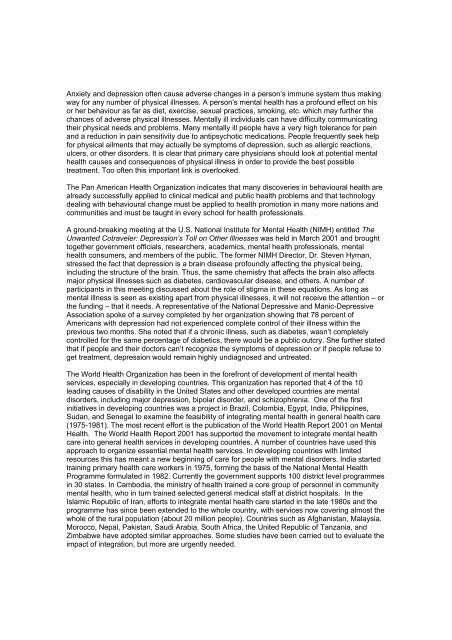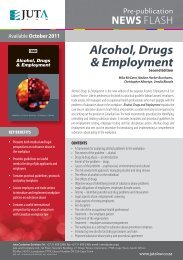INTRODUCTION TO WORLD MENTAL HEALTH DAY 10 OCTOBER ...
INTRODUCTION TO WORLD MENTAL HEALTH DAY 10 OCTOBER ...
INTRODUCTION TO WORLD MENTAL HEALTH DAY 10 OCTOBER ...
You also want an ePaper? Increase the reach of your titles
YUMPU automatically turns print PDFs into web optimized ePapers that Google loves.
Anxiety and depression often cause adverse changes in a person’s immune system thus making<br />
way for any number of physical illnesses. A person’s mental health has a profound effect on his<br />
or her behaviour as far as diet, exercise, sexual practices, smoking, etc. which may further the<br />
chances of adverse physical illnesses. Mentally ill individuals can have difficulty communicating<br />
their physical needs and problems. Many mentally ill people have a very high tolerance for pain<br />
and a reduction in pain sensitivity due to antipsychotic medications. People frequently seek help<br />
for physical ailments that may actually be symptoms of depression, such as allergic reactions,<br />
ulcers, or other disorders. It is clear that primary care physicians should look at potential mental<br />
health causes and consequences of physical illness in order to provide the best possible<br />
treatment. Too often this important link is overlooked.<br />
The Pan American Health Organization indicates that many discoveries in behavioural health are<br />
already successfully applied to clinical medical and public health problems and that technology<br />
dealing with behavioural change must be applied to health promotion in many more nations and<br />
communities and must be taught in every school for health professionals.<br />
A ground-breaking meeting at the U.S. National Institute for Mental Health (NIMH) entitled The<br />
Unwanted Cotraveler: Depression’s Toll on Other Illnesses was held in March 2001 and brought<br />
together government officials, researchers, academics, mental health professionals, mental<br />
health consumers, and members of the public. The former NIMH Director, Dr. Steven Hyman,<br />
stressed the fact that depression is a brain disease profoundly affecting the physical being,<br />
including the structure of the brain. Thus, the same chemistry that affects the brain also affects<br />
major physical illnesses such as diabetes, cardiovascular disease, and others. A number of<br />
participants in this meeting discussed about the role of stigma in these equations. As long as<br />
mental illness is seen as existing apart from physical illnesses, it will not receive the attention – or<br />
the funding – that it needs. A representative of the National Depressive and Manic-Depressive<br />
Association spoke of a survey completed by her organization showing that 78 percent of<br />
Americans with depression had not experienced complete control of their illness within the<br />
previous two months. She noted that if a chronic illness, such as diabetes, wasn’t completely<br />
controlled for the same percentage of diabetics, there would be a public outcry. She further stated<br />
that if people and their doctors can’t recognize the symptoms of depression or if people refuse to<br />
get treatment, depression would remain highly undiagnosed and untreated.<br />
The World Health Organization has been in the forefront of development of mental health<br />
services, especially in developing countries. This organization has reported that 4 of the <strong>10</strong><br />
leading causes of disability in the United States and other developed countries are mental<br />
disorders, including major depression, bipolar disorder, and schizophrenia. One of the first<br />
initiatives in developing countries was a project in Brazil, Colombia, Egypt, India, Philippines,<br />
Sudan, and Senegal to examine the feasibility of integrating mental health in general health care<br />
(1975-1981). The most recent effort is the publication of the World Health Report 2001 on Mental<br />
Health. The World Health Report 2001 has supported the movement to integrate mental health<br />
care into general health services in developing countries. A number of countries have used this<br />
approach to organize essential mental health services. In developing countries with limited<br />
resources this has meant a new beginning of care for people with mental disorders. India started<br />
training primary health care workers in 1975, forming the basis of the National Mental Health<br />
Programme formulated in 1982. Currently the government supports <strong>10</strong>0 district level programmes<br />
in 30 states. In Cambodia, the ministry of health trained a core group of personnel in community<br />
mental health, who in turn trained selected general medical staff at district hospitals. In the<br />
Islamic Republic of Iran, efforts to integrate mental health care started in the late 1980s and the<br />
programme has since been extended to the whole country, with services now covering almost the<br />
whole of the rural population (about 20 million people). Countries such as Afghanistan, Malaysia,<br />
Morocco, Nepal, Pakistan, Saudi Arabia, South Africa, the United Republic of Tanzania, and<br />
Zimbabwe have adopted similar approaches. Some studies have been carried out to evaluate the<br />
impact of integration, but more are urgently needed.

















